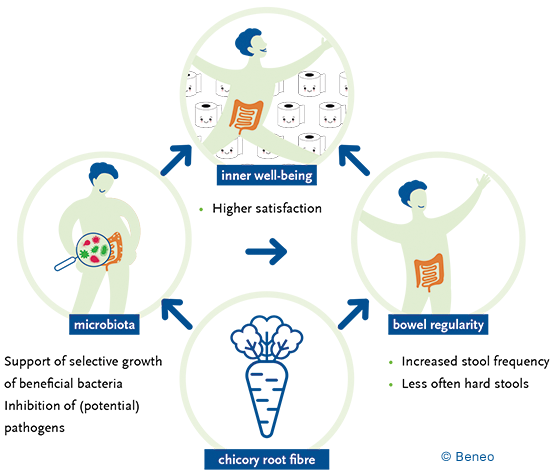Consumers are increasingly interested in the role that nutrition can play not only in their physical but also in their emotional well-being. Fibre up for an improved quality of life!
There is a growing interest in the effect that the gut microbiome has on our feeling of wellbeing. Roughly 7 in 10 believe it plays an important role in overall physical health. What’s more, 3 in 5 believe it impacts also their mood and daily energy levels (1).
The gut is where the magic happens
The digestive tract plays a crucial role for health and well-being. In the past, researchers, medical doctors and nutritionists/dietitians focused on the activities in the upper part of the intestine, the so-called small intestine, where digestion and absorption take place. The lower end of the intestine is the colon, also called the large intestine. For a long time it was just seen as the place where food residues are concentrated for final excretion as faeces. Today, it is an organ of super importance for health and well-being. Several essential functions with outreach to metabolism and other organs in the body are situated in the colon.
The link between digestive health and inner well-being with chicory root fibres
It has become obvious that the colon has a key role to play for overall and long-term health as well as inner well-being. Prebiotics are a unique tool to positively influence this organ and support its function by small dietary interventions. As of today, inulin and oligofructose (chicory root fibre) are the only clinically proven plant-based prebiotics. More than 30 human intervention studies are demonstrating the increase in bifidobacteria after intake of inulin or oligofructose from chicory roots. Enrichment of foods and drinks with these fibres is easy to apply and very tasty.
A review of the science of prebiotics is laid down in a consensus statement developed by the International Scientific Association for Probiotic and Prebiotics (ISAPP) in 2017 (2) and in a meta-analysis prepared by So et al. 2018 (3). Chicory root fibres support the colon’s health by increasing beneficial bacteria contributing to improved bowel regularity. The production of short-chain fatty acids upon prebiotic fermentation of chicory root fibres stimulates reflexes which make the bowel contents move. Furthermore, the increase in bifidobacteria means a higher bacterial biomass leading to more faecal bulk. In addition, stool softening occurs as more water stays in the colon instead of being re-absorbed. All this exerts an effect on stool frequency and/or stool consistency supporting overall bowel regularity within the normal range. These scientifically demonstrated improvements in regularity go hand in hand with an overall “feel-good” perception, measured scientifically by designated questionnaires addressing quality of life.
Improved inner well-being and digestive health with chicory root fibres
Improved regularity is obviously linked with a higher quality of life: people feel better. A deeper dive into this was done by Vandeputte et al. (4)
1. Statistics prove the correlation between specific parameters
Statisticians found a direct correlation between microbiota effects, stool characteristics and inner well- being. A correlation was found between lower amounts of the potentially harmful Bilophila bacterium and better satisfaction. Further, the scientists saw that lower amounts of Bilophila correlated with softer stools. This proves that chicory root fibre intake and aspects of digestive health and inner well-being are linked (4).
2. How daily intake of chicory root fibre improves digestive health and inner well-being
Achieving such inner happiness and feeling of well-being seems magic – but it isn’t, it is as simple as 1-2-3. By including small portions of Orafti® prebiotic fibres into your daily diet, you can already realise an effect. These increased fibre levels reach the gut and will allow its microorganisms to flourish and contribute to improved bowel regularity. The achievement of such inner well-being is a unique one – individual and with its own fibre balance.
A change of the daily diet is not a drastic one. For example, with a few grams of chicory root fibre in the morning bowl of cereal and another few in a mid-morning snack (like yoghurt or some cookies), one could already achieve the desired effect by lunchtime. Building this into your nutritional routine to achieve the personal fibre balance can make a world of difference!
Digestive health claim - only with BENEO
Customers working with Orafti® Inulin can launch products with a new health claim on pack: “promotes digestive health”. Only with BENEO, stake your claim on digestive health!
The official wording of this 13.5 health claim “chicory inulin contributes to normal bowel function by increasing stool frequency” was published by the European Commission and went into force on the 1st of January.
As it was based on proprietary scientific research by BENEO, it gives new opportunities just for those product innovations using Orafti® Inulin. Ultimately with the goal to give consumers the benefit of a healthy and balanced digestive system.

Contact us for the full version of Beneo’s paper on nutritional insights into inner wellbeing and quality of life.
References and study design dictionary
1. HFI Health Focus International Global Trend Study 2018
2. Gibson GR, Hutkins R, Sanders ME, Prescott SL, Reimer RA, Salminen SJ, Scott K, Stanton C, Swanson KS, Cani PD, Verbeke K, Reid G (2017) Expert consensus document: The International Scientific Association for Probiotics and Prebiotics (ISAPP) consensus statement on the definition and scope of prebiotics. Nat Rev Gastroenterol Hepatol 14(8):491–502. http://www.nature.com/articles/nrgastro.2017.75
3. So D, Whelan K, Rossi M, Morrison M, Holtmann G, Kelly JT, Shanahan ER, Staudacher HM, Campbell KL (2018) Dietary fiber intervention on gut microbiota composition in healthy adults: A systematic review and meta-analysis. Am J Clin Nutr 107(6):965–983. https://www.ncbi.nlm.nih.gov/pubmed/29757343
4. Vandeputte D, Falony G, Vieira-Silva S et al. (2017) Prebiotic inulin-type fructans induce specific changes in the human gut microbiota. Gut 66(11): 1968–1974. http://gut.bmj.com/content/gutjnl/66/11/1968.full.pdf


